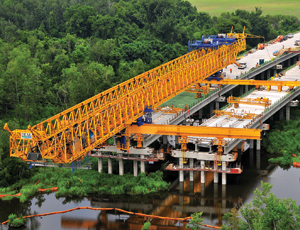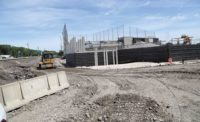Congress’s fast action on the $787.2-billion American Recovery and Reinvestment Act (ARRA) in February brought some much-needed cheer to the nation’s transportation contractors. With state DOT budgets withered by the recession, gas prices and financial market upheaval, contractors expected the influx of more than $49.3 billion in immediate highway, transit, and airport funding to reenergize the market and, hopefully, keep them busy until the larger economy begins to rebound. But more than six months after President Obama signed ARRA into law, many in the industry are still waiting for those hoped-for effects to kick in.

“The markets remain in disarray,” observes Rich Cavallaro, president of Skanska USA Civil, Whitestone, N.Y., who is quick to add that while the stimulus has so far fallen short of expectations, “Without it, I don’t know where we’d be.”
Industry leaders agree ARRA is fulfilling its intended pur-pose of helping states get shovel-ready projects moving. But with the exception of a handful of large-scale efforts such as the 3,389-ft-long fourth bore of the Caldecott Tunnel between Oakland and Orinda, Calif., which will use stimulus funds for approximately half of its estimated $400-million construction cost, most states are spreading the dollars across as many smaller-scale highway widening and pavement improvement projects as possible.
The result is fierce competition among contractors of all sizes, leading many projects to be awarded at prices well under initial projections, says Bob French, chief operating officer of Flatiron Construction Co., Longmont, Colo.
“The low prices are good for the states, but it’s very difficult to be competitive for design-bid-build jobs,” he says, adding that the bidding environment is particularly difficult for smaller contractors. “They need this work to survive.”
Thanks to their highway and bridge backlogs, large transportation contractors remain busy. Skanska is beginning the $182-million reconstruction of the 11th Street bridges and adjacent interchanges in Washington, D.C. Flatiron is entering the final phases of the $192-million 6.8-mile Highway 17 Bypass around Washington and Chocowinity, N.C., a project with joint venture partner United Contractors Inc., Johnston, Iowa; and the $348-million John James Audubon Bridge, a 1,583-ft-longcable-stayed bridge across the Mississippi River in St. Francisville, La., that will be the longest of its type in North America.
Still, uncertainty defines the transportation funding landscape. The continued fall-off in revenue from fuel taxes has exacerbated state-level budget woes and has Congress scrambling to keep the Highway Trust Fund solvent through the end of the current fiscal year.
Washington also is divided over how to proceed with the next iteration of transportation authorization bills, with the White House pushing for an 18-month extension of the current bill’s funding and allocation formulas. House Transportation and Infrastructure Committee Chair James Oberstar (D-Minn.) wants for a full six-year funding package.
With major energy and health-care initiatives already dominating the legislative agenda, a delay in crafting a new bill seems likely. But firms say any new bill must first address some key issues, particularly the Highway Trust Fund’s long reliance on gas taxes for revenue. “Congress will need to decide whether other appropriate...



Post a comment to this article
Report Abusive Comment